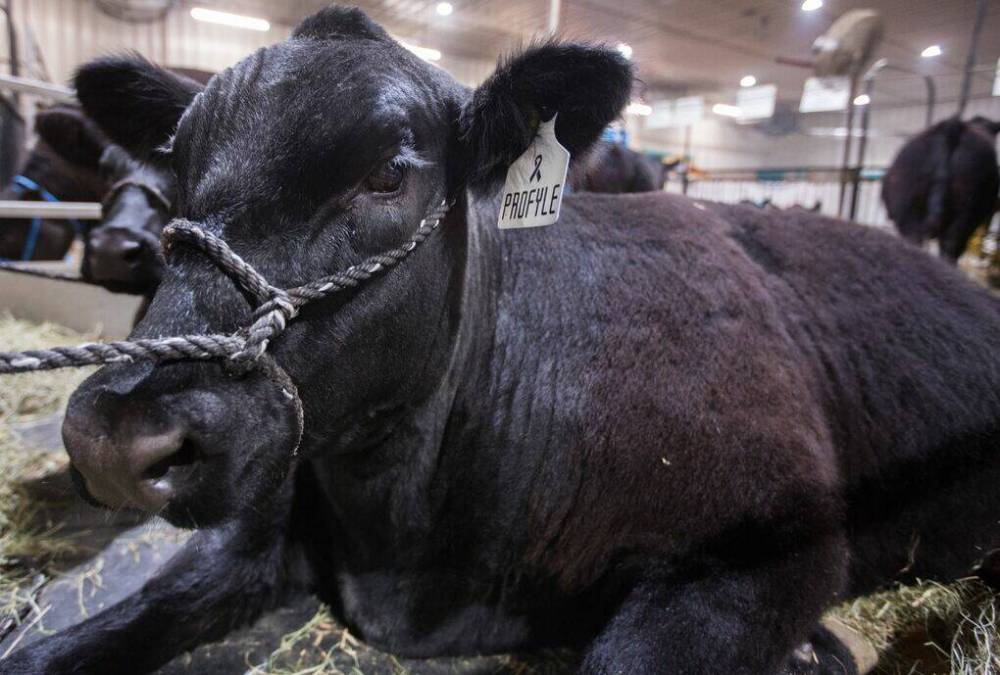Steer sale cancelled due to beef industry woes
Advertisement
Read this article for free:
or
Already have an account? Log in here »
We need your support!
Local journalism needs your support!
As we navigate through unprecedented times, our journalists are working harder than ever to bring you the latest local updates to keep you safe and informed.
Now, more than ever, we need your support.
Starting at $15.99 plus taxes every four weeks you can access your Brandon Sun online and full access to all content as it appears on our website.
Subscribe Nowor call circulation directly at (204) 727-0527.
Your pledge helps to ensure we provide the news that matters most to your community!
To continue reading, please subscribe:
Add Brandon Sun access to your Free Press subscription for only an additional
$1 for the first 4 weeks*
*Your next subscription payment will increase by $1.00 and you will be charged $20.00 plus GST for four weeks. After four weeks, your payment will increase to $24.00 plus GST every four weeks.
Read unlimited articles for free today:
or
Already have an account? Log in here »
Hey there, time traveller!
This article was published 02/04/2022 (1350 days ago), so information in it may no longer be current.
The Royal Manitoba Winter Fair cancelled its annual steer sale Thursday hours before it was set to take place.
The reason behind the last-minute change can be attributed to high feed prices and the uncertainty created by COVID-19, according to organizers.
The looming threat of COVID-19 public health measures potentially cancelling the Royal Manitoba Winter Fair before it got undeway this week, along with expensive feed created the perfect storm for producers, said Provincial Exhibition of Manitoba chair Dallas Johnston. The risks proved to be too high for many producers and the cattle sale saw limited opt-in from farmers, leading to its cancellation.

“Coming out of COVID it’s going to take some time to build some things, but we will get there,” Johnston said. “You can’t blame people when we didn’t know for sure if we were going to be able to proceed. These calves would have had to be on feed from November or December to be ready.”
Organizers and producers faced great uncertainty heading into the 2022 Winter Fair, Johnston said, and it remained unclear if they would be able to proceed with the fair until it was six weeks before showtime. This uncertainty was magnified by the high feed costs producers faced after the challenging 2021 season.
It takes months to prepare for a sale and ensure animals are ready for market.
“People didn’t want to buy that expensive feed to put into an animal on the chance they might be able to sell it here.”
While the Provincial Exhibition only announced Thursday the sale was cancelled, the event was officially put on ice before the start of the fair.
The majority of buyers knew ahead of time the sale would not be going ahead. The fair had only one fat steer enter the event, when it typically sees the sale of between 20 to 30 animals.
The cancellation also affected the fair’s CancerCare Manitoba Terry Fox PROFYLE fundraiser.
In 2019 Johnston and his family donated a steer named Profyle to raise money specifically for a program that helps young children dealing with challenging cancer diagnoses.
The 2019 PROFYLE sale raised $32,000 in support of the Terry Fox (PROFYLE) Precision Oncology for Young People initiative.
The cattle and PROFYLE sales are expected to return in 2023, Johnston said, adding he anticipates to see the number of participating animals double in comparison to previous years.
Sales across the province have been affected by the extreme weather in 2021, leading to high feed costs, said Manitoba Beef Producers general manager Carson Callum.
“The drought and other supply-chain issues have had a lot of market impacts that are impacting how sales are conducted.”
The price of feed has risen due to a lack of supply largely driven by the drought spanning from Ontario to British Columbia last year, Callum said.
“When you look at all those factors and the challenges with a really cold winter, it’s hard to get a strong feeding program in that balances that cost.”
COVID-19 has also impacted the beef sector in many ways, he added, because it has created uncertainty.
Manitoba cattle sales have felt these effects, especially because producers are struggling to maintain a strong footing in the industry.
These challenges are forcing producers to adjust how they market their animals. Reactions vary among production systems and can include engaging in early sales or not participating in markets.
Preparing an animal for sale varies based on what stage the cattle are being sold by producers. Production systems affect how long cattle are maintained by producers along with if they are sold as breeding stock or as feeder cattle.
Typically producers are planning months in advance for market sales, including weight gain and the number of animals that will be sold.
“There’s many months that go into planning for that delivery.”
For the beef industry to begin to recover from the damages of 2021 the province will need to be off to a better start in terms of moisture for the upcoming spring, Callum said. The amount of snow over the winter will hopefully lead to a better season that is complemented by timely rains.
Together, these factors will hopefully lower the cost of feed for producers and allow them to begin rebuilding herds.
» ckemp@brandonsun.com
» Twitter: @The_ChelseaKemp
